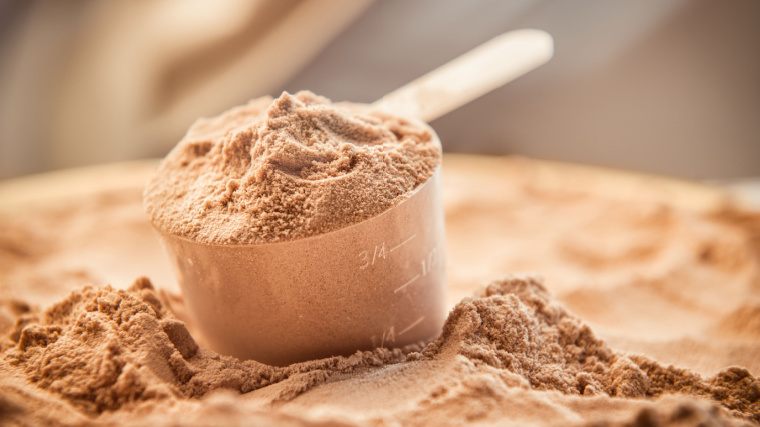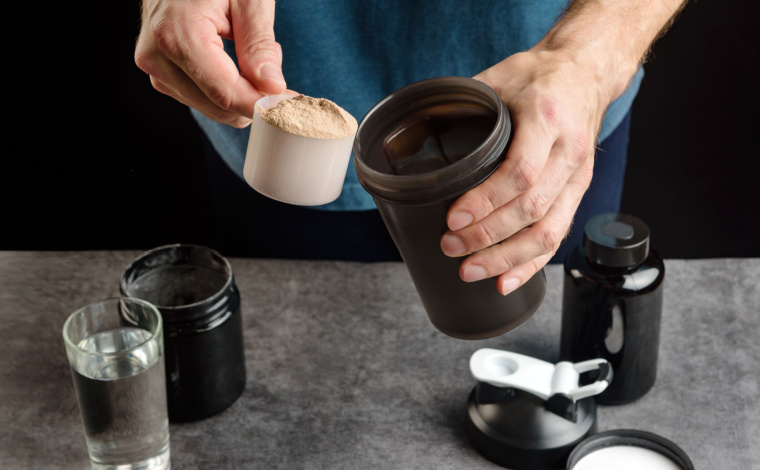After a tough workout, there’s nothing like drinking a quick protein shake to start your muscle recovery. When you have a high protein intake goal, you always strive to consume enough food to reach it. Longtime fitness enthusiasts know that all of that chicken breast or tofu can get daunting, and adding in a protein supplement can be a convenient boost.
But if you down protein shakes like it’s your job, you’ve probably asked yourself at some point: is too much protein powder bad for you? Even if you choose an organic powder, dietary supplements like protein powder aren’t regulated by the Food and Drug Administration (FDA). So what you want isn’t necessarily what you’re getting.

Here, we’ll unpack whether it’s possible to get too much of your favorite type of supplement: protein powder. We’ll explain what it is, how much protein you need, and look into the pros and cons of adding protein shakes to your diet.
- Is Too Much Protein Powder Bad For You?
- What Is Protein Powder?
- How Much Protein Do You Need Per Day?
- The Pros and Cons of Drinking Protein Shakes
- Frequently Asked Questions
Is Too Much Protein Powder Bad For You?
Healthcare professionals, registered dietitians, and nutritionists generally recommend aiming to get the majority of your nutrition from whole foods for optimal health and development. High-quality dietary protein from animal and plant-based foods contains more nutrients than supplements — though supplements do the job as an addition. (1)
Bodybuilders and other dedicated strength athletes with high protein needs may find themselves making more than one protein shake per day. It’s a convenient way to get extra grams of protein without the time and effort it takes to buy and prepare more food.
[Read More: Best Supplement Stacks]
Is it possible to have too much protein powder? Currently, there isn’t an established limit on how much protein powder is too much. Still, it’s best to get the majority of your protein through whole foods and make up the difference with your smoothies. (1) Consuming multiple protein shakes could also trigger side effects, including digestive issues, bloating, and cramping.
Possible Additives in Protein Powder Supplements
While your body may be fine with the protein itself, consuming protein powder could expose you to ingesting unwanted additives.
Dietary supplements, including protein powder, don’t need to be approved by the U.S. Food and Drug Administration (FDA) to be sold. The labels don’t need to state all of the ingredients, and they could potentially contain added chemicals or banned substances. (2)
In 2010 and 2018, Consumer Reports published studies stating that heavy metals were found in protein powder supplements. The 2018 study states that three servings of protein powder daily contain more than the maximum amount of heavy metals safe to ingest. (3)(4)

[Read More: Best Creatine Supplements]
The 2018 report references the Clean Label Project. The Clean Label Project analyzed 134 protein powder brands and found that 40 percent had elevated levels of heavy metals: arsenic, cadmium, lead, mercury, and BPA. They state that plant-based protein powders had higher levels than egg-based protein powders, and organic products had higher levels than non-organic products. (5)
A study published in the Toxicology Reports Journal analyzed these claims. They investigated if ingesting protein powder causes a high enough exposure to heavy metals to harm your health. This study suggests that heavy metals in protein powder do not pose an increased non-carcinogenic risk to human health and that carcinogenic risks were not posed by exposure to heavy metals in protein powder supplements. (6)
If you find yourself still concerned with heavy metal exposure, you may want to avoid ingesting more than three servings of protein powder per day. But it seems that heavy metals found in these supplements may not pose the risks to health that was once thought. (6)
What Is Protein Powder?
Protein powder is a dietary supplement. It is a concentrated form of protein made from animal or plant-based sources and processed into powder form. You can use it in smoothies and other recipes to boost your protein intake.
When choosing a protein powder, check that it is a high-quality, complete protein. Complete protein contains all essential amino acids needed to build muscle, and they are available to be quickly absorbed. (7)
Types of Protein Powder
Protein supplements are either derived from lactose, like whey and casein, or from various plant-based protein sources. Below are the different types of protein powder:
- Whey Protein Concentrate
- Whey Protein Isolate
- Whey Protein Hydrolysate
- Casein Protein Powder
- Egg White Powder
- Soy Protein Powder
- Pea Protein Powder
- Hemp Protein Powder
- Rice Protein Powder
Whole Food Sources of Protein
If you’re concerned about too much protein powder or simply want to boost your overall nutritional intake, you can always increase your intake of protein-rich foods. Here are some high-protein foods to add to your healthy eating repertoire.
- Animal-based: lean meats, poultry, beef, fish, eggs, and dairy products
- Plant-based: tofu, tempeh, legumes, lentils, soybeans, and seeds
How Much Protein Do You Need Per Day?
Although it’s unclear how much protein powder is too much, there are clearer limits on the total amount of protein you should get daily.
In the fitness world, we’re all about protein for muscle, but you need it for bodily functions at rest, too. In the Dietary Guidelines for Americans, the FDA recommends 50 grams per day as a minimum amount for bodily functions. The recommended dietary allowance (RDA) for sedentary people of all ages is 0.8 grams of protein per kilogram of body weight. (8)(9)
Active people will need more than that to support muscle recovery. Try BarBend’s protein intake calculator for a personalized recommendation.
Protein Intake Calculator
[Read More: Omega 3 Benefits — More Muscle, Better Recovery, and Enhanced Endurance]
The American College of Sports Medicine (ACSM) recommends active people get 1.2 to 1.7 grams of protein per kilogram of body weight daily. (10)
For body composition goals, you’ll likely want to go even higher (in addition to resistance training). The ACSM and the International Society of Sports Nutrition (ISSN) offer the following recommendations for gaining muscle mass, competitive bodybuilding, and losing body fat:
- The ACSM recommends a minimum of 1.6 grams and a maximum of 2.2 grams of protein per kilogram of body weight for muscle growth. (10)
- The ISSN states 1.4 to 2.0 grams of protein per kilogram of body weight for building muscle. (11)
- Competitive bodybuilders can increase to 2.3 to 3.1 grams of protein per kilogram of body weight to gain muscle. (12)
- For fat loss while maintaining lean muscle, the ISSN recommends 2.3 to 3.1 grams of protein per kilogram of body weight. (11)
Other research lists 3.5 grams of protein per kilogram of body weight as the maximum daily amount. (1)
The Pros and Cons of Drinking Protein Shakes
Protein shakes are convenient but come with some drawbacks. Let’s break it down.
The Pros of Drinking Protein Shakes
Getting enough protein is essential to your overall health. When combined with resistance training, it also helps with building muscle mass, losing body fat, and recovering from workouts. Drinking protein shakes is a convenient way to boost your intake to get these benefits.
Overall Health Benefits
There are many health benefits of protein, and you can use protein shakes to help reach your intake. Eating enough protein as part of a healthy diet can improve your heart health by lowering your risk of cardiovascular diseases, high blood pressure, high cholesterol, and type 2 diabetes. (13)
Getting enough protein, along with calcium and vitamin D, can improve bone health and help prevent osteoporosis in older adults. For older adults, protein supplements may also help prevent the natural muscle loss of aging. (14)(15)
[Read More: High-Protein, Low-Calorie Foods Worth Subbing Into Your Diet]
Amino acids present in protein supplements can also boost your immune system. Arginine, glutamine, and cysteine function as antioxidants and may strengthen your immune cells. (16)
Helps Build Muscle
Protein helps you build muscle when following a resistance training program; it’s been well-established in scientific studies over the years. While you lift weights, you break down your muscle fibers. Consuming protein outside of the gym builds them back up. The amino acids in protein help stimulate muscle protein synthesis, leading to hypertrophy or muscle growth. (17)(18)
A systematic review of studies on protein supplements investigated the link between protein powder and muscle, strength, and power. It looked at untrained people and athletes. The review found that in the first few weeks of a workout program, protein shakes did not impact muscle mass in untrained people. As the volume and frequency of training increased over a more extended period, untrained people had more significant hypertrophy, strength, and power gains. (19)

[Read More: Best Post-Workout Supplements]
So you won’t bulk up after a one-off workout followed by a shake. When you follow a resistance training program with progressive overload and consume enough calories and macronutrients overall, protein supplements may help you build muscle. (19)
Helps With Fat Loss
If you have a goal of fat loss, eating plenty of protein can help you on your journey.
Protein is known to be the most satiating macronutrient. A high-protein diet may increase your satiety hormone (GLP-1) while reducing your hunger hormone (ghrelin). If you’re reducing your calories or portions, using a protein shake can help you get more grams of protein without a ton of extra calories while feeling satiated. (20)
Protein also has a higher thermic effect of food, requiring your body to burn more energy to digest it. A higher thermic effect may boost thermogenesis, slightly increasing your total daily energy expenditure (TDEE). (21)
Lastly, research shows that keeping your protein intake high (and resistance training) during weight loss can help your body preserve lean muscle. Some people can lose weight just by reducing their food intake, but they could experience muscle loss as well. Protein shakes are a way to help reach a high protein intake goal while maintaining muscle. (22).
Helps Muscle Recovery
Whatever your fitness goal is, you need protein for muscle recovery. Recovery from training is when the gains occur, so you can come back feeling strong and keep making progress. After lifting, protein helps repair cell damage and stimulate hormonal and metabolic processes. This boosts your cell immunity and helps improve recovery. (23)
Protein shakes can be a quick way to help with muscle recovery after the gym if you have a tight schedule.
The Cons of Drinking Protein Shakes
Protein powder is generally considered safe but can affect everyone differently. You may want to consult a doctor before trying a new supplement.
May Cause Digestive Issues
Some people are sensitive to protein shakes and may experience digestive issues. If you are lactose-intolerant, drinking whey protein may trigger bloating, cramping, and other unpleasant gastrointestinal side effects.
You may want to try a vegan protein powder to see if it helps.
May Contain Heavy Metals
Consumer Reports and The Clean Label Project found that many protein supplements contain heavy metals. A later study found that heavy metals in protein supplements may not harm your health. However, it’s something to keep in mind if it’s important to you. (3)(4)(5)(6)
High-Protein Diets May Be Harmful to Those With Kidney Diseases
There has been a popular claim that consuming too much protein can cause kidney stones and be harmful to your renal health. The claim has been refuted — research suggests that protein shakes and a high-protein diet should not be harmful for people without kidney diseases. (24)
[Read More: Best Pre-Workouts]
However, a high-protein diet may be harmful to people with kidney diseases. The National Kidney Foundation recommends that people with chronic kidney disease should keep their protein intake to 0.6 to 0.75 grams of protein per kilogram of body weight. (24)
If you’ve been given medical advice to keep your protein intake low, you may not want to add on with protein shakes.
Lacks Other Nutrients
Depending on what you add to your protein shake, they may lack other nutrients. Some protein powders are low in carbohydrates, and it’s important to get a balanced amount of macronutrients each day for your overall health. They may also lack fiber and other micronutrients.
Including protein shakes as part of an overall healthy diet can be great, but solely relying on them won’t give you everything you need.
Bulking Up
Gymgoers often love protein powder for a quick boost after a workout. While there’s not a definitive limit for how much protein powder you should have in a day, you may want to focus on getting most of your nutrition from whole foods. Calculate your personal protein needs first and adjust intake accordingly.
Protein shakes can help you reach your protein intake goal for overall health, building muscle, losing body fat, and muscle recovery. However, they may cause digestive issues, contain heavy metals, and lack other nutrients. People with kidney disease may want to steer clear as well since the medical advice is to typically keep their protein intake lower.
Frequently Asked Questions
Here, we will answer some common questions about a common post-workout drink.
How much protein powder per day is too much?
There is no known answer, but it may be harmful to go over your daily protein intake goal regularly if you have kidney issues. If you have protein powder that exceeds the intake recommended for you, that may be too much.
Is it bad to have protein powder every day?
There is no current research stating that it’s bad to have protein powder every day. However, the answer may be different for everyone, and it’s best to consult with a healthcare provider.
What is the maximum amount of protein powder per day?
A Consumer Reports study stated that consuming more than three servings of protein powder per day may expose you to exceedingly high levels of heavy metals. (4) While other research suggests that this exposure may not have negative health impacts, under three scoops may be a figure you choose to stick to. (6)
References
- Wu G. Dietary protein intake and human health. Food Funct. 2016 Mar;7(3):1251-65.
- Ronis MJJ, Pedersen KB, Watt J. Adverse Effects of Nutraceuticals and Dietary Supplements. Annu Rev Pharmacol Toxicol. 2018 Jan 6;58:583-601.
- (2010, July 1). Health risks of protein drinks. Consumer Reports.
- Hirsch, J. (2018, March 12). Arsenic, Lead Found in Popular Protein Supplements. Consumer Reports.
- (2018). Protein Powder Infographic. Clean Label Project.
- Bandara SB, Towle KM, Monnot AD. A human health risk assessment of heavy metal ingestion among consumers of protein powder supplements. Toxicol Rep. 2020 Aug 21;7:1255-1262.
- Hoffman JR, Falvo MJ. Protein – Which is Best? J Sports Sci Med. 2004 Sep 1;3(3):118-30.
- USDA. Current dietary guidelines. Dietary Guidelines for Americans, 2020-2025.
- Lonnie M, Hooker E, Brunstrom JM, Corfe BM, Green MA, Watson AW, Williams EA, Stevenson EJ, Penson S, Johnstone AM. Protein for Life: Review of Optimal Protein Intake, Sustainable Dietary Sources and the Effect on Appetite in Ageing Adults. Nutrients. 2018 Mar 16;10(3):360.
- Rodriguez NR, DiMarco NM, Langley S; American Dietetic Association; Dietitians of Canada; American College of Sports Medicine: Nutrition and Athletic Performance. Position of the American Dietetic Association, Dietitians of Canada, and the American College of Sports Medicine: Nutrition and athletic performance. J Am Diet Assoc. 2009 Mar;109(3):509-27.
- Jäger R, Kerksick CM, Campbell BI, Cribb PJ, Wells SD, Skwiat TM, Purpura M, Ziegenfuss TN, Ferrando AA, Arent SM, Smith-Ryan AE, Stout JR, Arciero PJ, Ormsbee MJ, Taylor LW, Wilborn CD, Kalman DS, Kreider RB, Willoughby DS, Hoffman JR, Krzykowski JL, Antonio J. International Society of Sports Nutrition Position Stand: protein and exercise. J Int Soc Sports Nutr. 2017 Jun 20;14:20.
- Helms ER, Aragon AA, Fitschen PJ. Evidence-based recommendations for natural bodybuilding contest preparation: nutrition and supplementation. J Int Soc Sports Nutr. 2014 May 12;11:20.
- Hu FB. Protein, body weight, and cardiovascular health. Am J Clin Nutr. 2005 Jul;82(1 Suppl):242S-247S.
- Bonjour JP. Dietary protein: an essential nutrient for bone health. J Am Coll Nutr. 2005 Dec;24(6 Suppl):526S-36S.
- Ambulkar P, Hande P, Tambe B, Vaidya VG, Naik N, Agarwal R, Ganu G. Efficacy and safety assessment of protein supplement – micronutrient fortification in promoting health and wellbeing in healthy adults – a randomized placebo-controlled trial. Transl Clin Pharmacol. 2023 Mar;31(1):13-27.
- Li P, Yin YL, Li D, Kim SW, Wu G. Amino acids and immune function. Br J Nutr. 2007 Aug;98(2):237-52.
- Camera DM. Evaluating the Effects of Increased Protein Intake on Muscle Strength, Hypertrophy and Power Adaptations with Concurrent Training: A Narrative Review. Sports Med. 2022 Mar;52(3):441-461.
- Stokes T, Hector AJ, Morton RW, McGlory C, Phillips SM. Recent Perspectives Regarding the Role of Dietary Protein for the Promotion of Muscle Hypertrophy with Resistance Exercise Training. Nutrients. 2018 Feb 7;10(2):180.
- Pasiakos SM, McLellan TM, Lieberman HR. The effects of protein supplements on muscle mass, strength, and aerobic and anaerobic power in healthy adults: a systematic review. Sports Med. 2015 Jan;45(1):111-31.
- Pesta DH, Samuel VT. A high-protein diet for reducing body fat: mechanisms and possible caveats. Nutr Metab (Lond). 2014 Nov 19;11(1):53.
- Paddon-Jones D, Westman E, Mattes RD, Wolfe RR, Astrup A, Westerterp-Plantenga M. Protein, weight management, and satiety. Am J Clin Nutr. 2008 May;87(5):1558S-1561S.
- Moon J, Koh G. Clinical Evidence and Mechanisms of High-Protein Diet-Induced Weight Loss. J Obes Metab Syndr. 2020 Sep 30;29(3):166-173.
- Kreider RB, Campbell B. Protein for exercise and recovery. Phys Sportsmed. 2009 Jun;37(2):13-21.
- Cuenca-Sánchez M, Navas-Carrillo D, Orenes-Piñero E. Controversies surrounding high-protein diet intake: satiating effect and kidney and bone health. Adv Nutr. 2015 May 15;6(3):260-6.
Featured Image: Nick Starichenko / Shutterstock